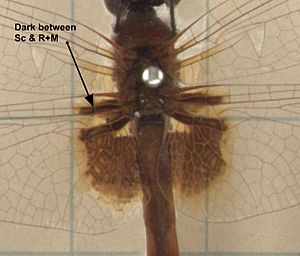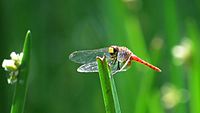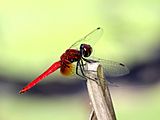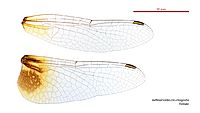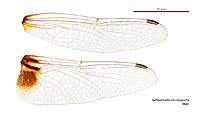Square-spot basker facts for kids
Quick facts for kids Square-spot basker |
|
|---|---|
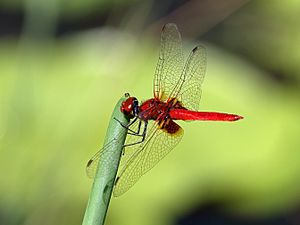 |
|
| Male Aethriamanta circumsignata, Northern Territory, Australia | |
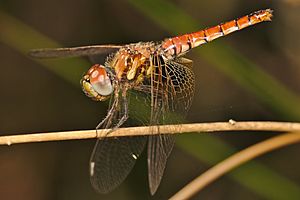 |
|
| Female Aethriamanta circumsignata | |
| Conservation status | |
| Scientific classification | |
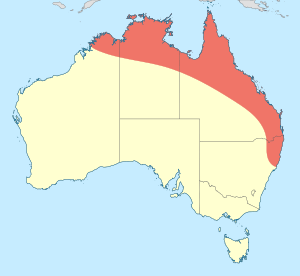 |
The square-spot basker (scientific name: Aethriamanta circumsignata) is a type of dragonfly. It belongs to the Libellulidae family, which is a group of dragonflies often called "skimmers." You can find this dragonfly in Australia and New Guinea. It usually lives near calm or slow-moving water, like ponds or quiet streams.
Contents
What is a Square-Spot Basker?
The square-spot basker is a small dragonfly. Its wings can spread out about 40 to 60 millimeters wide. That's about the length of a few paperclips! Most of these dragonflies are red. Their wings have fewer veins than bigger dragonflies.
One special thing about them is a brown mark on their back wings. This mark is shaped like a square at the very base of the wing. This unique mark is how the dragonfly got its common name. Even though they live near water, adult square-spot baskers can sometimes be seen flying far away from it. Experts have checked on this species and say it is not in danger of disappearing.
Where Does This Dragonfly Live?
In northern Australia, you can find the square-spot basker along the coast and a bit inland. They live in a wide area, stretching from Broome, Western Australia all the way to Coffs Harbour in New South Wales. This shows they can live in many different places across the region.
How to Identify a Square-Spot Basker
It can be tricky to tell the square-spot basker apart from another similar dragonfly, the L-spot basker (Aethriamanta nymphaeae). Both have dark marks at the base of their back wings.
The square-spot basker usually has two small, dark brown spots. These spots are between certain veins on the wing. Below these spots, there's a larger, dark square-shaped patch. This patch has a tiny clear area inside it, close to the dragonfly's body. A lighter brown color often surrounds these dark marks. This lighter color might even reach the edge of the wing. Sometimes, you might also see light brown marks at the base of their front wings.
Gallery



